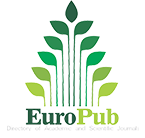Morphology and characteristics of polyethersulfone membrane modified with polyethylene glycol hexadecyl ether and nanocarbon
Vol 7, Issue 1, 2024
VIEWS - 3698 (Abstract)
Abstract
The development of polyethersulfone (PES) membranes to improve membrane performance can be done in various ways; one is by combining two types of additives (organic and inorganic) in one dope polymer solution. In this study, researchers analyzed the effect of combining polyethylene glycol hexadecyl ether (PEG-HE) as an organic additive and nanocarbon as an inorganic additive on the characteristics and performance of PES membranes. The membrane performance test includes analysis of pure water flux and rejection of synthetic fertilizer factory wastewater (Mg2+) with a concentration of 300 ppm. The membrane characterization was carried out by analyzing the morphology of the membrane structure using Scanning Electron Microscopy (SEM), water contact angle (WCA), porosity, and membrane pore size. Ultrafiltration experiment showed that the modified PES membrane with PEG-HE and Nanocarbon had the highest pure water flux. The most significant rejection coefficient of 96.88% was found in an ultrafiltration experiment using pure PES membranes. The characteristic of other membranes will be described in detail in this article.
Keywords
Full Text:
PDFReferences
- Abdel-Karim A, Leaper S, Alberto M, et al. High flux and fouling resistant flat sheet polyethersulfone membranes incorporated with graphene oxide for ultrafiltration applications. Chemical Engineering Journal 2018; 334: 789–799. doi: 10.1016/j.cej.2017.10.069
- Tang YP, Cai T, Loh D, et al. Construction of antifouling lumen surface on a poly(vinylidene fluoride) hollow fiber membrane via a zwitterionic graft copolymerization strategy. Separation and Purification Technology 2017; 176: 294–305. doi: 10.1016/j.seppur.2016.12.012
- Gonzales RR, Sasaki Y, Istirokhatun T, et al. Ammonium enrichment and recovery from synthetic and real industrial wastewater by amine-modified thin film composite forward osmosis membranes. Separation and Purification Technology 2022; 297: 121534. doi: 10.1016/j.seppur.2022.121534
- Otitoju TA, Ahmad AL, Ooi BS. Recent advances in hydrophilic modification and performance of polyethersulfone (PES) membrane via additive blending. RSC Advances 2018; 8(40): 22710–22728. doi: 10.1039/C8RA03296C
- Fahrina A, Arahman N, Aprilia S, et al. Functionalization of PEG‐AgNPs hybrid material to alleviate biofouling tendency of polyethersulfone membrane. Polymers (Basel) 2022; 14(9): 1908. doi: 10.3390/polym14091908
- Arahman N, Rosnelly CM, Yusni Y, et al. Ultrafiltration of α-lactalbumin protein: Acquaintance of the filtration performance by membrane structure and surface alteration. Polymers (Basel) 2021; 13(21): 3632. doi: 10.3390/polym13213632
- Raouf M, Abedini R, Omidkhah M, Nezhadmoghadam E. A favored CO2 separation over light gases using mixed matrix membrane comprising polysulfone/polyethylene glycol and graphene hydroxyl nanoparticles. Process Safety and Environmental Protection 2020; 133: 394–407. doi: 10.1016/j.psep.2019.11.002
- Mamah SC, Goh PS, Ismail AF, et al. Recent development in modification of polysulfone membrane for water treatment application. Journal of Water Process Engineering 2021; 40: 101835. doi: 10.1016/j.jwpe.2020.101835
- Lusiana RA, Sangkota VDA, Sasongko NA, et al. Permeability improvement of polyethersulfone-polietylene glycol (PEG-PES) flat sheet type membranes by tripolyphosphate-crosslinked chitosan (TPP-CS) coating. International Journal of Biological Macromolecules 2020; 152: 633–644. doi: 10.1016/j.ijbiomac.2020.02.290
- Chan KH, Wong ET, Irfan M, et al. Enhanced Cu(II) rejection and fouling reduction through fabrication of PEG-PES nanocomposite ultrafiltration membrane with PEG-coated cobalt doped iron oxide nanoparticle. Journal of the Taiwan Institute of Chemical Engineers 2015; 47: 50–58. doi: 10.1016/j.jtice.2014.09.033
- Ma Y, He X, Xu S, et al. Enhanced 2-D MOFs nanosheets/PES-g-PEG mixed matrix membrane for efficient CO2 separation. Chemical Engineering Research and Design 2022; 180: 79–89. doi: 10.1016/j.cherd.2022.02.017
- Mokarizadeh H, Raisi A. Industrial wastewater treatment using PES UF membranes containing hydrophilic additives: Experimental and modeling of fouling mechanism. Environmental Technology & Innovation 2021; 23: 101701. doi: 10.1016/j.eti.2021.101701
- Prince JA, Bhuvana S, Boodhoo KVK, et al. Synthesis and characterization of PEG-Ag immobilized PES hollow fiber ultrafiltration membranes with long lasting antifouling properties. Journal of Membrane Science 2014; 454: 538–548. doi: 10.1016/j.memsci.2013.12.050
- Khan A, Sherazi TA, Khan Y, et al. Fabrication and characterization of polysulfone/modified nanocarbon black composite antifouling ultrafiltration membranes. Journal of Membrane Science 2018; 554: 71–82. doi: 10.1016/j.memsci.2018.02.063
- Zhigunov DM, Shilkin DA, Kokareva NG, et al. Single-walled carbon nanotube membranes as non-reflective substrates for nanophotonic applications. Nanotechnology 2021; 32: 9. doi: 10.1088/1361-6528/abcacc
- Ambarita AC, Mulyati S, Arahman N, et al. Improvement of properties and performances of polyethersulfone ultrafiltration membrane by blending with bio-based dragonbloodin resin. Polymers (Basel) 2021; 13(24): 4436. doi: 10.3390/polym13244436
- Arahman N, Jakfar J, Dzulhijjah WA, et al. Hydrophilic antimicrobial polyethersulfone membrane for removal of turbidity of well-water. Water (Switzerland) 2022; 14(22): 3769. doi: 10.3390/w14223769
- Saljoughi E, Mousavi SM, Hosseini SA. Polysulfone/Brij-58 blend nanofiltration membranes: preparation, morphology and performance. Polymers for Advanced Technologies 2011; 24(4): 383–390. doi: 10.1002/pat.3092
- Tofighy MA, Mohammadi T, Sadeghi MH. High-flux PVDF/PVP nanocomposite ultrafiltration membrane incorporated with graphene oxide nanoribbones with improved antifouling properties. Journal of Applied Polymer Science 2021; 138(4): 1–15. doi: 10.1002/app.49718
- Bolandi S, Ashtiani FZ, Okhovat A, Ghandashtani MB. The effects of surfactant additives on properties and morphologies of cellulose acetate membranes prepared by phase inversion. Theoretical Foundations of Chemical Engineering 2020; 54: 931–939. doi: 10.1134/S0040579520050292
- Kusworo TD, Ismail AF, Mustafa A. Hybrid membrane using polyethersulfone-modification of multiwalled carbon nanotubes with silane agent to enhance high performance oxygen separation. International Journal of Science and Engineering 2014; 6(2): 163–168. doi: 10.12777/ijse.6.2.163-168
- Arahman N, Fahrina A, Wahab MY, Fathanah U. Morphology and Performance of Polyvinyl Chloride Membrane Modified with Pluronic F127. F1000 Research 2018; 7: 726. doi: 10.12688/f1000research.15077.2
- He M, Wang L, Lv Y, et al. Novel polydopamine/metal organic framework thin film nanocomposite forward osmosis membrane for salt rejection and heavy metal removal. Chemical Engineering Journal 2020; 389: 124452. doi: 10.1016/j.cej.2020.124452
DOI: https://doi.org/10.24294/ace.v7i1.2291
Refbacks
- There are currently no refbacks.
License URL: https://creativecommons.org/licenses/by-nc/4.0/









